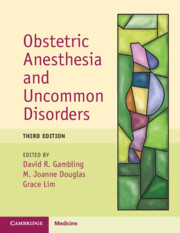Book contents
- Obstetric Anesthesia and Uncommon Disorders
- Obstetric Anesthesia and Uncommon Disorders
- Copyright page
- Cover Illustration
- Epigraph
- Contents
- Preface to Obstetric Anesthesia and Uncommon Disorders, 3rd edition
- Glossary of Common Abbreviations Used in this Text
- Gambling et al.: Obstetric Anesthesia: List of Contributors
- Chapter 1 Obstetric Anesthesia for the Parturient with Complex Medical Diseases
- Chapter 2 Point-of-Care Ultrasound for Obstetrics: Basics and Introductory Chapter
- Chapter 3 FoCUSed Cardiac Ultrasound for Cardiac Disorders
- Chapter 4 Challenging Cardiac Disorders in Pregnancy
- Chapter 5 Uncommon Cardiac Dysrhythmias in Pregnancy
- Chapter 6 Arterial Vascular Diseases
- Chapter 7 Uncommon Respiratory Disorders in Pregnancy
- Chapter 8 Airway Issues
- Chapter 9 Use of Neuraxial Ultrasound for Axial Skeletal Conditions
- Chapter 10 Myopathies and the Parturient
- Chapter 11 Parturients of Short Stature
- Chapter 12 Disorders of the Vertebral Column
- Chapter 13 Miscellaneous Skeletal and Connective Tissue Disorders
- Chapter 14 Disorders of the Central Nervous System in Pregnancy
- Chapter 15 Spinal Cord Disorders
- Chapter 16 Peripheral Neuropathies
- Chapter 17 Disorders of Intermediaries of Metabolism and Malignant Hyperthermia
- Chapter 18 Hepatic Conditions
- Chapter 19 Renal Diseases in Pregnancy
- Chapter 20 Rare Endocrine Disorders
- Chapter 21 Disorders of Blood, Coagulation, and Bone Marrow
- Chapter 22 Infectious Diseases in Pregnancy
- Chapter 23 Dermatologic Conditions in Pregnancy
- Chapter 24 Psychiatric Disorders in Pregnancy
- Chapter 25 Substance Use Disorder
- Chapter 26 Autoimmune Disease
- Chapter 27 Genetic Disorders
- Chapter 28 Anesthesia for Rare Fetal and Placental Conditions
- Index
- Plate Section (PDF Only)
- References
Chapter 26 - Autoimmune Disease
Published online by Cambridge University Press: 26 January 2024
- Obstetric Anesthesia and Uncommon Disorders
- Obstetric Anesthesia and Uncommon Disorders
- Copyright page
- Cover Illustration
- Epigraph
- Contents
- Preface to Obstetric Anesthesia and Uncommon Disorders, 3rd edition
- Glossary of Common Abbreviations Used in this Text
- Gambling et al.: Obstetric Anesthesia: List of Contributors
- Chapter 1 Obstetric Anesthesia for the Parturient with Complex Medical Diseases
- Chapter 2 Point-of-Care Ultrasound for Obstetrics: Basics and Introductory Chapter
- Chapter 3 FoCUSed Cardiac Ultrasound for Cardiac Disorders
- Chapter 4 Challenging Cardiac Disorders in Pregnancy
- Chapter 5 Uncommon Cardiac Dysrhythmias in Pregnancy
- Chapter 6 Arterial Vascular Diseases
- Chapter 7 Uncommon Respiratory Disorders in Pregnancy
- Chapter 8 Airway Issues
- Chapter 9 Use of Neuraxial Ultrasound for Axial Skeletal Conditions
- Chapter 10 Myopathies and the Parturient
- Chapter 11 Parturients of Short Stature
- Chapter 12 Disorders of the Vertebral Column
- Chapter 13 Miscellaneous Skeletal and Connective Tissue Disorders
- Chapter 14 Disorders of the Central Nervous System in Pregnancy
- Chapter 15 Spinal Cord Disorders
- Chapter 16 Peripheral Neuropathies
- Chapter 17 Disorders of Intermediaries of Metabolism and Malignant Hyperthermia
- Chapter 18 Hepatic Conditions
- Chapter 19 Renal Diseases in Pregnancy
- Chapter 20 Rare Endocrine Disorders
- Chapter 21 Disorders of Blood, Coagulation, and Bone Marrow
- Chapter 22 Infectious Diseases in Pregnancy
- Chapter 23 Dermatologic Conditions in Pregnancy
- Chapter 24 Psychiatric Disorders in Pregnancy
- Chapter 25 Substance Use Disorder
- Chapter 26 Autoimmune Disease
- Chapter 27 Genetic Disorders
- Chapter 28 Anesthesia for Rare Fetal and Placental Conditions
- Index
- Plate Section (PDF Only)
- References
Summary
An autoimmune disease represents a pathological condition caused by an immune response directed against an antigen within the body of the host. The incidence and activity of autoimmune diseases are particularly high in young women and hence their occurrence in parturients is not uncommon. Autoimmune diseases often involve multiple systems and have a wide range of clinical manifestations and complications necessitating a multidisciplinary approach to management in the obstetric population, involving obstetricians, anesthesiologists, neonatologists, and rheumatologists. All affected organ systems should be evaluated and advice from appropriate medical specialties sought. The effect of autoimmune diseases and their treatment on pregnancy, and the effect of pregnancy on the disease itself varies between individual diseases. This chapter discusses the implications of the following autoimmune diseases in pregnancy: rheumatoid arthritis, systemic lupus erythematosus, polyarteritis nodosa, systemic sclerosis, antiphospholipid syndrome, and multiple sclerosis.
Keywords
- Type
- Chapter
- Information
- Obstetric Anesthesia and Uncommon Disorders , pp. 421 - 442Publisher: Cambridge University PressPrint publication year: 2024

